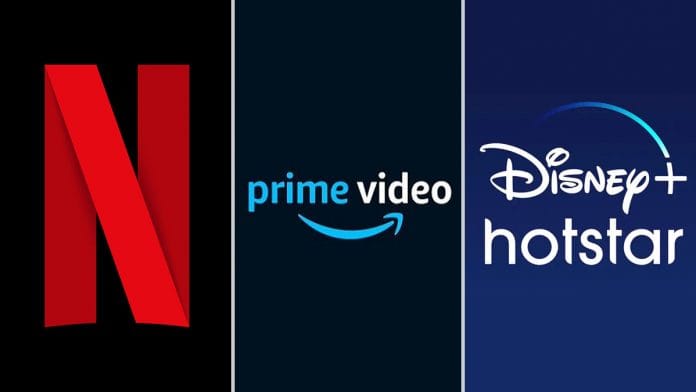New Delhi: The Internet and Mobile Association of India (IAMAI) announced Thursday the adoption of an ‘Implementation Toolkit’ for major video streaming platforms such as Netflix, Amazon Prime and Disney+ Hotstar.
The ‘toolkit’ will help the platforms put into practice the Universal Self-Regulation Code signed by 17 streaming players in September last year.
The new document also addresses certain issues flagged by the government in the code, such as the lack of independent third-party monitoring and clarity on what comprises prohibited content.
Amit Goenka, chair of IAMAI’s Digital Entertainment Committee, said in a statement issued by the body that the toolkit amplifies all the critical points in the streaming platforms’ self-regulation code and aims to address the feedback received from the Ministry of Information and Broadcasting, particularly on strengthening the grievance redressal mechanism.
“It further sets out clear tent poles that the OCCPs (Online Curated Content Providers) need to undertake to achieve a common goal of entertaining millions of Indians responsibly,” he added.
The toolkit came into effect from 10 February. The I&B ministry, which now oversees all online platforms, is also set to come out with a separate set of broad guidelines for the content.
Also read: PVR woos Bollywood producers to bring films back to cinema halls from Netflix, Amazon
What is an ‘implementation toolkit’?
The streaming platforms that have signed the Universal Self-Regulation Code are ZEE5, Viacom 18 (Voot), Disney+ Hotstar, Amazon Prime Video, Netflix, SonyLiv, MX Player, Jio Cinema, Eros Now, Alt Balaji, Arre, HoiChoi, Hungama, Shemaroo, Discovery Plus, Aha and Lionsgate Play.
There are nearly 40 video streaming platforms that currently operate in India.
The IAMAI statement said the new document will assist these signatories in making a seamless transition to self-regulation, and guide them on the relevant laws of the land, which will be adhered to by the signatories with respect to content.
It will also guide them on fair and transparent functioning of the grievance redressal mechanism, with a provision to escalate the matter to an advisory panel featuring independent members; and on holding training programmes for creative and legal teams of OCCPs to enhance the knowledge and nuances of laws that govern content.
The toolkit will also guide them on holding awareness programmes for consumers to help increase the understanding and use of age rating, content description and parental controls, and in implementing a detailed audit and compliance mechanism.
Provisions in the new document
The toolkit specifically lists the applicable laws of the land and the relevant provisions that the platforms will have to adhere to for content. This includes relevant sections of the Information Technology Act, the Indian Penal Code and the Indecent Representation of Women (Prohibition) Act, 1986, among others.
On the crucial grievance redressal mechanism, it mandates that the signatories set up a two-tier structure comprising an internal committee and an advisory panel.
Any complaint over content streamed by the platforms will first come to the internal committee composed of company representatives.
If the complainant is not satisfied with the decision of the internal committee and wishes to escalate the complaint, it will go to the advisory panel.
The government had objected to an earlier provision that called for this panel to largely consist of company representatives. The toolkit amends the provision, saying the panel will contain an equal number of independent members and company representatives. The chairperson of the panel, an independent member, will have the casting vote if a tie-breaker is needed.
The toolkit also provides for creating an IAMAI secretariat that will, among other things, review the signatories’ compliance with the provisions of the code.
It also states that the IAMAI will engage in consumer awareness campaigns on media and engage with parent associations and schools on the availability of safety measures for protecting children’s interest.
Some internet rights experts sceptical
Apar Gupta, executive director of the Internet Freedom Foundation, an NGO working in the realm of digital rights advocacy, is among the experts in this domain who are unimpressed with the toolkit. He called it the outcome of the controversies and legal threats faced by online video streaming platforms.
“It is an outcome of placating a growing intolerance which, unfortunately, has also been supported by registration of criminal cases and statements by senior public officials and politicians,” Gupta told ThePrint.
Gupta said it is unfortunate that the toolkit largely mimics the censorship practices in the television and broadcast sector.
“This will impact the diversity of original content being produced in India. At the same time, it will over time cede greater space to self-censorship and government control. These trends are clear in broadcast television programming,” he added.
Also read: Why the world is out to de-fang Facebook, Amazon, Apple, Netflix and Google







Self regulations are a farce.
Govt needs to have complete control over what is streamed in India.